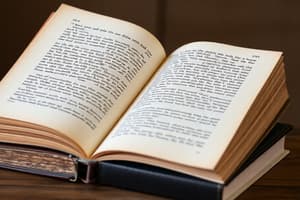Podcast
Questions and Answers
What fundamental role does literature play in reflecting human life?
What fundamental role does literature play in reflecting human life?
- It is only about fictional stories.
- It serves as a mirror to great themes of human existence. (correct)
- It does not connect with the author's experiences.
- It solely provides entertainment.
Which of the following characteristics is NOT typically associated with literature?
Which of the following characteristics is NOT typically associated with literature?
- Casual writing style (correct)
- Permanent value
- Heightened emotional effect
- Excellent format
Which of the following is an example of nonfiction?
Which of the following is an example of nonfiction?
- Hamlet by W. Shakespeare
- A history book (correct)
- The little match girl by Hans Christian Andersen
- Harry Potter by J.K. Rowling
What does the term 'genre' refer to in literature?
What does the term 'genre' refer to in literature?
What is a primary benefit of engaging with literature?
What is a primary benefit of engaging with literature?
Which statement best defines prose?
Which statement best defines prose?
How does literature enhance one’s understanding of life and culture?
How does literature enhance one’s understanding of life and culture?
Which of the following is a characteristic of fiction?
Which of the following is a characteristic of fiction?
Flashcards
What is literature?
What is literature?
The study of written works that are considered to be artistic and valuable, such as novels, plays, and poems.
What is poetry?
What is poetry?
A style of writing that uses imaginative language and structure to express emotions and ideas.
What is prose?
What is prose?
A style of writing that uses straightforward language and focuses on factual information.
What is a genre?
What is a genre?
Signup and view all the flashcards
What is fiction?
What is fiction?
Signup and view all the flashcards
What is non-fiction?
What is non-fiction?
Signup and view all the flashcards
What is a benefit of reading literature?
What is a benefit of reading literature?
Signup and view all the flashcards
How does literature improve your writing?
How does literature improve your writing?
Signup and view all the flashcards
Study Notes
Introduction to Literature
- Literature reflects the significant aspects of human life, similar to a mirror reflecting one's self-image.
- Literature encompasses valued written works, including novels, plays, and poems. (Oxford Advanced Learners' English Dictionary definition)
Defining Literature
- Literature is a profound personal experience, meticulously crafted in detailed imagery through structure, stylistic choices, and rich metaphors.
- Literature also embodies a collection of writings that depict societal class struggles.
- Literature's value lies not only in its content but also in its form, emphasizing the importance of how the story is conveyed.
Characteristics of All Writing
- All writing possesses inherent enduring worth.
- Strong writing exhibits an outstanding structure.
- Writing should evoke imagination or offer insightful interpretation.
- Effective writing heightens the emotional response of the reader.
Importance of Literature
- Literature enhances one's command of language.
- Literature provides insights into the lives, cultures, and experiences of people globally.
- Literature offers knowledge about far-flung parts of the world that one may never visit.
- Literature provides amusement and entertainment.
- Literature fosters wisdom and deepens one's understanding and judgment.
- Literature encourages introspection and comparison of personal experiences with those of others.
- Literature significantly contributes to language development through improved reading comprehension.
Literary Genres
- Genre, derived from the French word meaning "type" or "kind," categorized literary works.
- English literature is classified into drama, fiction, nonfiction, and poetry.
- Drama genres include comedy, tragedy, and tragicomedy.
- Fiction examples encompass fantasy, folklore, historical accounts, and realism.
- Nonfiction examples include biography, autobiography, narrative, and periodicals.
- Poetry genres consist of lyric and dramatic poetry.
- All written forms fall under either fiction or nonfiction.
Fiction
- Fiction is not factual but rooted in the author's imagination.
- Fiction examples include plays, poems, short stories, and novels. (Examples referenced: Hamlet by Shakespeare, poems of Shakespeare, The little match girl by Hans Christian Andersen, Harry Potter by J.K. Rowling, and Great Expectations by Charles Dickens.)
Nonfiction
- Nonfiction is based on true events or documented facts.
- Nonfiction examples include journals, magazines, newspapers, and books (e.g., historical accounts).
Prose and Poetry
- Prose and poetry are two key textual forms in American English.
- Prose, drawn from the Latin word "prōsa," meaning "straightforward," is the most common type of writing. (Examples include newspapers, novels, and magazines)
- Poetry, originating from the Latin word "poeta," focuses on aesthetic and evocative language beyond apparent meaning. Poetry often utilizes structured word arrangements to heighten the reader's emotional experience.
Prose vs. Poetry
- Prose does not usually employ rhyme or rhythm.
- Prose is typically longer and structured in sentences and paragraphs.
- Prose language frequently reflects everyday speech patterns.
- Poetry commonly includes rhyme and rhythm.
- Poetry tends to be condensed, using lines and stanzas instead of sentences.
- Poetry often employs figurative language.
- Prose is typically understood by reading once; poetry frequently requires repeated or thorough reading for full comprehension.
Conclusion
- Literature serves as a profound tool to explore diverse experiences and gain deep understanding.
Studying That Suits You
Use AI to generate personalized quizzes and flashcards to suit your learning preferences.




